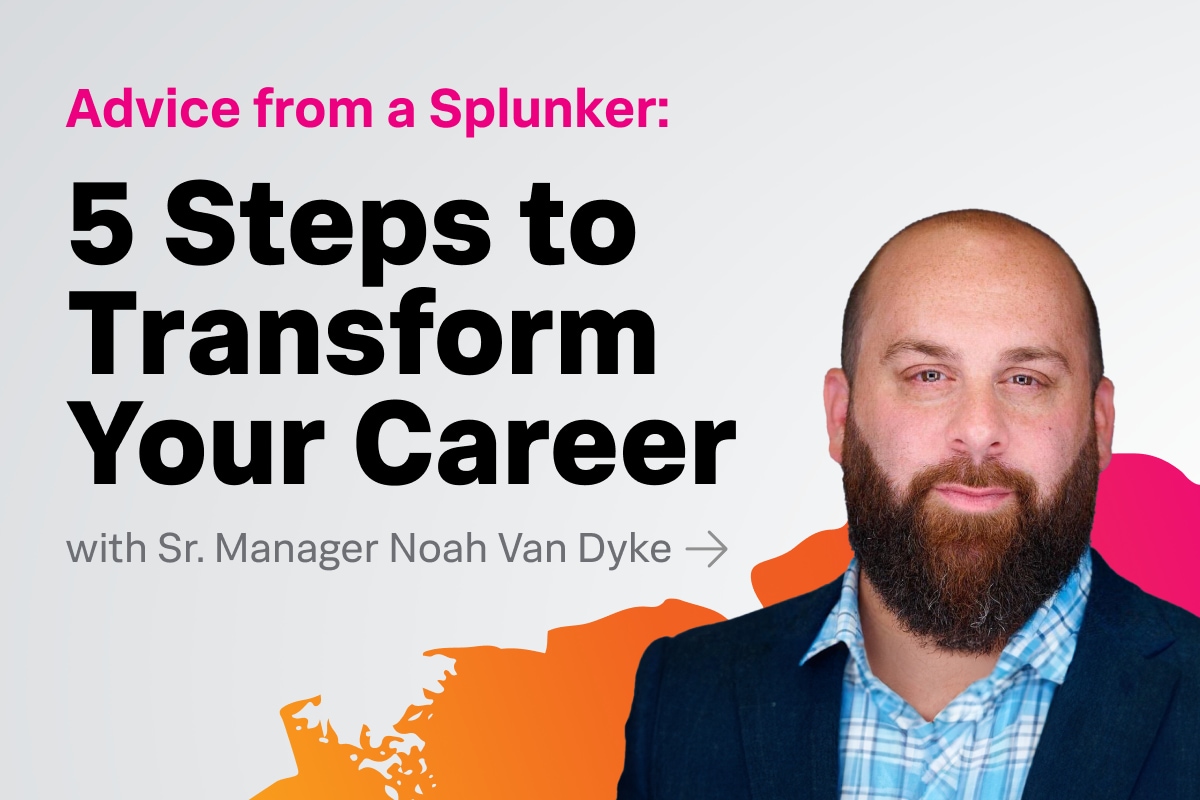Advice From a Splunker: 5 Steps to Transform Your Career

Since joining Splunk in 2019, Senior Manager Noah Van Dyke has been on an exciting career growth journey. Like many Splunkers, his path wasn’t a linear one — growing from an individual contributor into a people manager, Noah moved across multiple customer success positions and dove deep into many different parts of Splunk’s public sector customer success business. Now, he leads Splunk's Customer Success and Experience team as a Senior Manager, covering the Public Sector Federal Civilian territory, which includes many of Splunk’s largest and most complex public sector customers.
I met with Noah to reflect on his adventure-filled career and hear more about how he approaches his own professional development. He shared five key practices that he lives by that have allowed him to grow and thrive.
1. Share your career goals with your manager and team
When Noah applied for a role at Splunk, he decided to step away from managing a team and join as an individual contributor, learning a totally new position and segment. While Noah quickly became a top performer in his own right, he was still very passionate about leading a team again one day — and he made this career goal known to his managers and colleagues. So, when an interim people manager role came up, his team knew he was interested.
“I had the opportunity to step into a manager position for six months while one of my peers was on leave, and I think that really set my career in motion here,” Noah says. “It gave me the opportunity to showcase what I could bring to the table as a leader and as a collaborator with other sales leaders and solutions engineers.”
2. Don’t be afraid to think bigger!
Since his jaunt as an interim leader, Noah has continued to take on more leadership responsibilities at Splunk. After a tour leading Splunk’s State, Local, and Higher Education customer success team, Noah recently returned from paternity leave as the Customer Success and Experience portfolio leader for the Federal Civilian theater. In addition to being a new dad and taking on new responsibilities in a new territory, Noah deliberately made time for a public leadership graduate education program (after encouragement from his boss, Dave Zimmerman!) through Harvard’s Kennedy School of Government, which he was able to get reimbursed through Splunk’s benefits program, to further his career development.
So, how did he do it? By thinking BIG! “It's so important to continuously think bigger than what's in scope today for your current role,” he says. “One must think beyond just ‘my accounts’ or ‘my customers.' Instead, you should be thinking about how you can help influence more customers, what you can do to shape Splunk business, or what training you might need to make an impact at a theater-wide level.” He credits his leaders and peers with helping him foster this important perspective.
3. Seek out opportunities and take action
“One key thing that allowed me to grow was leaning in, raising my hand, and getting involved with special projects,” Noah says. One experience that set him up for growth was being involved in the Hire Military Internship Program. This program is designed to help transition service members into civilian life and give them an experience in tech roles that are very different from their military positions.
“Being able to serve as a mentor, coach, and leader to individuals in the program, so many of whom have faced altogether different challenges and accumulated more real world experience than I could ever imagine, has been so rewarding,” Noah says. “My advice for people looking to grow is to really stretch yourself to try things that maybe you don't know how to do, and be willing to work with people from across the organization who you can learn from and who you can teach.”
4. Embrace collaboration — across roles, regions, and function
Taking advantage of the variety of expertise within the company is a great way to learn new things and get relevant advice, especially in a remote work environment. In doing this, Noah has found that the mentorship, coaching, empathy, and encouragement he’s received has completely transformed his career. “Build connections and leverage the ecosystem. Explore different functions, even when there’s no immediate need to collaborate right now. Find counterparts in other parts of the organization,” Noah advises. “And then sit down and figure out how you can work together and help one another. Having the right relationships can help you easily solve a problem for a customer, overcome a challenge, or even grow into a new role you never even knew existed.”
5. Get comfortable with being uncomfortable
Staying ahead in the ever-changing tech world requires courage, flexibility, and resilience. In Noah’s experience, that means challenging himself, his peers, and the status quo, and facing those ambiguous and uncertain moments head-on with wild ideas and new solutions. “Businesses are constantly changing, and I’ve found that at Splunk there's always interest in exploring new ideas or ways of doing things,” he says. “Some days that's challenging and some days it's really fun, exciting, and interesting. You have to be willing to put yourself out there and experience being uncomfortable… and then dive in head first.”
Come Reach New Heights With Us
A big thank you to Noah for sharing his development story and advice for others to grow in their careers! At Splunk, we believe that supporting our employees to learn and grow is not only vital for creating an amazing workplace, but is critical for us to build a better world for global businesses and humanity. Learn more about career development at Splunk.
See What Splunk Life Is All About
Hear more from Noah and other Splunkers on how they have grown in their roles and been encouraged to both find and follow their passions at Splunk.
Related Articles
About Splunk
The world’s leading organizations rely on Splunk, a Cisco company, to continuously strengthen digital resilience with our unified security and observability platform, powered by industry-leading AI.
Our customers trust Splunk’s award-winning security and observability solutions to secure and improve the reliability of their complex digital environments, at any scale.


